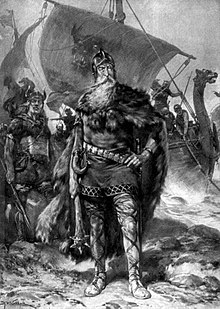Rurik
| Rurik | |
|---|---|
Rurik | |
| Religion | Norse paganism |
Rurik (also spelled Rorik, Riurik or Ryurik;.
Traditionally, Rurik has been considered the founder of the
Life
The earliest mention of Rurik is contained in the Primary Chronicle, traditionally ascribed to Nestor and compiled in c. 1113,[11] which states that East Slavic and Finnic tribes in 860–862 (including the Chuds, Slovenes, Krivichs, Meryans and Ves) "drove the Varangians back beyond the sea, refused to pay them tribute, and set out to govern themselves".[12] Afterwards the tribes started fighting each other and decided to invite the Varangians, led by Rurik, to reestablish order. Rurik came along with his younger brothers Sineus and Truvor and a large retinue.[1]
According to the chronicle, Rurik was one of the
Sineus established himself at Beloozero, and Truvor at the town of Izborsk. Truvor and Sineus died shortly after the establishment of their territories,[17][18] and Rurik consolidated these lands into his own territory, extending his rule in northern Russia.[1] Askold and Dir, followers of Rurik who were sent to Constantinople, seized Kiev before launching an attack recorded in Byzantine sources for the year 860.[19][17]
The
Rurik is said to have remained in power until his death some time in the 870s.
Legacy
Rurik does not appear in the regnal list in the opening section of the Hypatian Codex (compiled c. 1425); the list of knyazi ("princes") of Kiev starts with "Dir and Askold", followed by "Oleg", and then "Igor".[23]
The Rurikids were the ruling dynasty of
The king Michał Korybut Wiśniowiecki reigned in the Polish–Lithuanian Commonwealth until 1673; a member of the House of Wiśniowiecki, who traditionally traced their descent to the Gediminids, recent studies side with a Rurikid origin of the House of Zbaraski and its cadet branches including the House of Wiśniowiecki.[26][27]
Alternative theories

The name Rurik is a form of the Old Norse name
Rorik of Dorestad reappeared in Frankish chronicles in 870, when his Friesland demesne was returned to him by Charles the Bald. In 882, Rorik is mentioned as dead (without a specific date of death).[citation needed] The Primary Chronicle places the death of Rurik of Novgorod in 879,[29] three years earlier than the Frankish chronicles. According to western sources, the ruler of Friesland was converted to Christianity by the Franks.[citation needed]
The idea of identifying Rurik of Rus' with Rorik of Dorestad was revived by the anti-Normanists
Gallery
-
Image of Rurik in the "Tsar's titularnik" (1672)
-
Rurik and his brothers Sineus and Truvor arrive at Ladoga. Painted by Viktor Vasnetsov (c. 1913)
Notes
References
- ^ ISBN 9780192854346.
- Ketola, Kari; Vihavainen, Timo (2014). Changing Russia? : history, culture and business (1. ed.). Helsinki: Finemor. p. 1. ISBN 978-9527124017.
- Dixon-Kennedy, Mike (1998). Encyclopedia of Russian & Slavic myth and legend. Santa Barbara, Calif.: ABC-CLIO. p. 232. ISBN 9781576070635.
- Ketola, Kari; Vihavainen, Timo (2014). Changing Russia? : history, culture and business (1. ed.). Helsinki: Finemor. p. 1.
- ISBN 9780712637640.
- from the original on 3 December 2021. Retrieved 3 December 2021.
- ^ Lotha, Gloria. "Rurik | Norse leader | Britannica". www.britannica.com. Archived from the original on 11 October 2014. Retrieved 9 March 2023.
- ISBN 978-5-04-107383-1. Archivedfrom the original on 23 July 2023. Retrieved 21 July 2023.
- ISBN 978-1-317-87224-5.
- ISBN 978-3-030-53797-5.
- ^ Ostrowski 2018, p. 46.
- ^ Ostrowski 2018, p. 42.
- ISBN 1107639425.
- ISBN 9781538119426.)
{{cite book}}: CS1 maint: location missing publisher (link - ISBN 9789004363816.
- ISBN 9780300208344.)
{{cite book}}: CS1 maint: location missing publisher (link- Jones, Gwyn (1984). A history of the Vikings (Revised ed.). Oxford. p. 246. ISBN 9780192801340.)
{{cite book}}: CS1 maint: location missing publisher (link
- Jones, Gwyn (1984). A history of the Vikings (Revised ed.). Oxford. p. 246.
- ^ "The Vikings at home". History Extra. 24 September 2012. Archived from the original on 4 May 2020. Retrieved 26 February 2021.
- Mark, Joshua J. (3 December 2018). "Kievan Rus". World History Encyclopedia. Archived from the original on 14 April 2021. Retrieved 23 April 2021.
- Sorabella, Jean (October 2002). Heilbrunn Timeline of Art History: The Vikings (780–1100). New York: Metropolitan Museum of Art. Archived from the original on 23 April 2020. Retrieved 26 February 2021.
- ISBN 9780521035521. Archivedfrom the original on 14 April 2023. Retrieved 2 February 2014.
- ^ Stefan Brink, "Who were the Vikings?', in The Viking World Archived 14 April 2023 at the Wayback Machine, ed. by Stefan Brink and Neil Price (Abingdon: Routledge, 2008), pp. 4–10 (pp. 6–7).
- ^ ISBN 9781538119426.)
{{cite book}}: CS1 maint: location missing publisher (link - ^ ISBN 9781576070635.
- ISBN 9789004138742.
- ISBN 9780521425674.
- ISBN 9780192801340.)
{{cite book}}: CS1 maint: location missing publisher (link - ISBN 9781487570477.)
{{cite book}}: CS1 maint: location missing publisher (link - ^ Ostrowski 2018, p. 36.
- ^ Christian Raffensperger and Norman W. Ingham, "Rurik and the First Rurikids", The American Genealogist, 82 (2007), 1–13, 111–119.
- ^ Kalmistopiiri, julkaissut (27 October 2021). "Ruhtinas ja ruhtinaan pojat – paljastavatko geenit Venäjän perustajana pidetyn Rurikin alkuperän?". KALMISTOPIIRI (in Finnish). Archived from the original on 26 September 2022. Retrieved 3 September 2022.
- ^ Księstwa Rzeczpospolitej: państwo magnackie jako region polityczny
- ISBN 978-966-03-8155-1.
- ^ Omeljan Pritsak, "Rus'", in Medieval Scandinavia: An Encyclopedia Archived 26 April 2023 at the Wayback Machine, ed. Phillip Pulsiano (New York: Garland, 1993), pp. 555–56.
- ^ Ostrowski 2018, p. 40.
- ^ Kirpichnikov, Anatoly H. "Сказание о призвании варягов. Анализ и возможности источника". Первые скандинавские чтения, СПб; 1997; ch. 7–18.
- ^ Nazarenko, Alexander. "Rjurik и Riis Th., Rorik", Lexikon des Mittelalters, VII; Munich, 1995; pp. 880, 1026.
Bibliography
- Halperin, Charles J. (2022). The Rise and Demise of the Myth of the Rus' Land (PDF). Leeds: Arc Humanities Press. p. 107. ISBN 9781802700565. Retrieved 1 February 2023.
- Ostrowski, Donald (2018). "Was There a Riurikid Dynasty in Early Rus'?". Canadian-American Slavic Studies. 52 (1): 30–49. .



